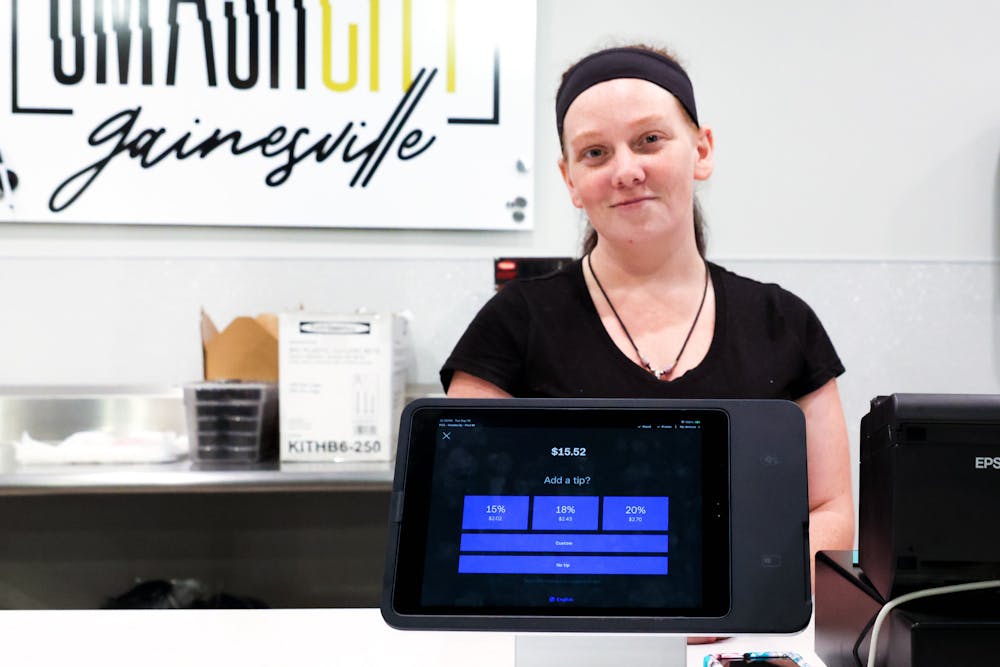Presidential candidates Kamala Harris and Donald Trump don’t often agree, yet both have proposed eliminating the federal income tax on tips.
The policy seems like a boon to low- and middle-income earners, but many do not make enough to owe federal income tax anyway. ‘No tax on tips’ would only benefit 2.5% of the workforce.
A mere 5% of employees paid in the bottom quarter of wages — those who earn less than $18 an hour — work in tipped capacities. This cohort is disproportionately young; the median age of tipped earners is 31, and a third are below 25.
That includes baristas like Andrea Jimenez, a 19-year-old UF nutritional science sophomore.
Jimenez works at Concord Coffee on West University Avenue and estimates about half of her pay comes from tips. She said she welcomes service-worker-friendly amendments to the tax code.
“Obviously, I would love it if I didn't have to declare tax on my tips,” she said.
Though inflation has cooled, Jimenez said she and others still feel squeezed.
“In this economy, it's really hard, and so many people are complaining,“ she said.
If even the most ideologically disparate candidates agree to address workers’ pay, Jimenez added, “Maybe it's a problem. Maybe [people should] pay attention to it.”
Trump announced a ‘no tax on tips’ proposal in the battleground state of Nevada, where leisure and hospitality make up one in four jobs. Harris later added it to her campaign platform as the policy gained traction in Reno and Las Vegas.
UF political science professor David Macdonald said proposing to eliminate taxes on tips is pure political posturing.
Macdonald cited the economy as a top-of-mind issue for voters but said tax policy is less salient than inflation and the cost of living. But promising to champion the interests of the working class is broadly attractive to swaths of the persuadable electorate, Macdonald said.
“With two parties instead of ten parties, they have to pitch this big tent and appeal to as many groups as possible,” he said.
Roger Austin, who teaches campaign management at UF, agrees with Macdonald — invoking pro-worker rhetoric was a solid political move for both presidential candidates.
Austin, however, said he identifies with ‘tip fatigue,’ exhausted with the pressure to leave a trail of loose bills everywhere.
“I’m going to certainly start leaving a tip jar in front of my classes and say, ‘Do you like today’s lecture? Give me 10%,’” Austin said.
Local Jimmy John’s assistant manager and delivery driver Sergei Klein, 25, is also unsure tips need more protection. Klein estimates half his pay comes from tips but remains skeptical that a policy exempting those earnings from taxes would substantially affect his finances. Even if it did, he doesn’t think that’s necessary.
Although he appreciates customers' generosity, Klein said patrons are justified in wondering why they must tip on an order with a built-in delivery fee.
Klein also laments the rise of automatic tipping, and he’s in good company. More than seven in 10 Americans believe tip expectations have substantially increased in the past five years, appearing in unexpected places like self-service kiosks in airports, restaurants and stadiums.
Jada Hopkins, a 15-year-old high school sophomore, works as a server at The Teacher’s Ade in City Food Hall. Unlike others annoyed with the ubiquity of tip screens, Hopkins said tips are often well-deserved.
Understanding what it’s like to work for every dollar and cent, Hopkins said she liberally doles out tips to others.
According to the Center for Economic Policy and Research, tips subsidize wages, enabling employers to pay tip earners less than the federal minimum wage of $7.25 and that of their state. Florida’s minimum wage is $12.
About 37% of Americans believe employers should increase pay instead of expecting customers to foot the bill.
Josiah Lloyd, 35, disagrees. Lloyd is a tattoo artist who works on commission at Bodytech, a local tattoo and piercing shop. He estimates that tips compose 10% of his income, a pay structure he’d much prefer to a fixed rate.
Working for tips incentivizes Lloyd to uphold a standard of excellence for his clients.
“[Tips encourage] you to remember the person’s name, who their family is, what’s going on in their lives,” Lloyd said. “You make that extra money because of being involved.” Lloyd predicts a ‘no tax on tips’ policy would be only nominally helpful for him.
Seventeen-year-old UF business freshman Mariana Anidos, who works at Just Salad, agrees with Lloyd — gratuities motivate her to provide top-notch customer service. Anidos believes she and other service workers should not pay taxes on their tipped income.
“They deserve the full tip if they’re the ones that earned it,” she said.
But if Anidos could cast a ballot in November, a ‘no tax on tips’ policy wouldn’t influence her vote.
“It would definitely make me think,” she said, “but it wouldn't make my decision for me.”
Contact Natalie Kaufman at nkaufman@alligator.org. Follow her on X @Nat_Kauf.
Natalie Kaufman is the business enterprise reporter and a second-year journalism major. Outside the newsroom, you'll catch her drinking too much caffeine and running.






